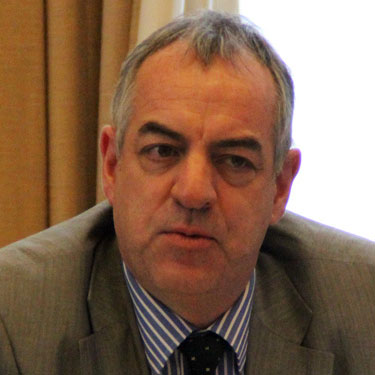- ON THE DECADE
- THE DECADE'S CAMPAIGN
- REPORTING ON PROGRESS
- THE DECADE'S PROGRAMMES
- FOCUS AREAS
-
- Access to sanitation
- Financing water
- Gender and water
- Human right to water
- Integrated Water Resources Management
- Transboundary waters
- Water and cities
- Water and energy
- Water and food security
- Water and sustainable development
- Water and the green economy
- Water cooperation
- Water quality
- Water scarcity
- FOCUS REGIONS
- RESOURCES FOR
- UN e-RESOURCES
Water for Life Voices
Voices of Experts
Graham Alabaster
Senior Technical Officer Water, Sanitation and Health. World Health Organization (WHO) Department of Public Health and Environment

"I think the most exciting thing over the last 10 years in water has been the way water has moved up as a priority within the development sector. I am worried that sanitation is still down there; it’s frightening. I do think that [recent figures] provide an opportunity now to look at sanitation and I think one of the reasons sanitation is down there is because it’s been seen as the poor relation [to the water sector] but if we start to talk about it more, and people become aware, it will move up the agenda. And I think that growing awareness is very interesting. I think it’s also very good that the UN agencies are working together more closely than they were; partly because of things like UN-Water but also because of initiatives taken by these agencies. That’s what I think is most exciting.
Looking back with UN-Habitat for a long time, we get the urban dimension, as well as water and sanitation. For a long time it had been all rural, though we’d been pushing for a long time for people to look at the range of urban, from megacities to small villages and everything inbetween, and I think we’ve had some success because I’ve seen the other UN agencies and some of the development partners and they’re now looking at programmes specifically dealing with smaller urban centres which for me is marvellous. I think there’s a lot to be done in smaller urban areas. Smaller urban areas don’t have the heavy politics of the bigger megacities, so we’re working with groups of small cities and we can do a lot more. So I’m very happy about that. I also think that we have a great relationship between UN-Habitat and the WHO now. Our CEO understands the health issues and the critical impact of water and sanitation on health.
In the future I’m hoping that we can support countries, develop frameworks where they can get involved with their own resources or whatever rather than these UN-centric decision making processes. I think for me we have to reach out to the countries that need development, to really understand what their needs are, and enable them to have self-determination with regards to their water futures. "
>> Intro
>> Progress
>> Pride
>> Hope
>> Your Voice
>> End
>> Full Exhibition
>> Ecosystems
>> Empowering communities
>> Food security
>> Gender and water
>> Groundwater
>> Hygiene
>> Open defecation
>> Participation
>> Sustainable development
>> Water and culture
>> Water and disasters
>> Water and energy
>> Water and health
>> Water for cities
>> Water efficiency
>> Water quality
>> Water scarcity
>> Voices of experts
>> Voices from business
>> Voices from the civil society
>> Voices from the field: case studies
>> Africa
>> Asia and the Pacific
>> Europe
>> Latin America and the Caribbean
>> Middle East
>> Oceania
>> Decade’s achievements. From MDGs to SDGs
>> Five years of UN-Water "Water for Life"
Awards 2011-2015
>> Water for Life Voices
Copyright | Terms of use | Privacy notice | Site Index | Fraud alert | Help




